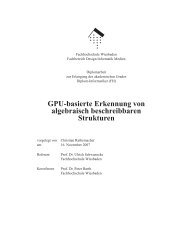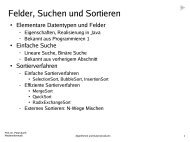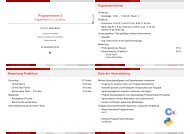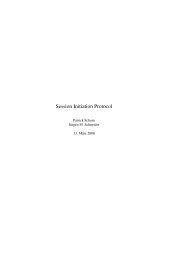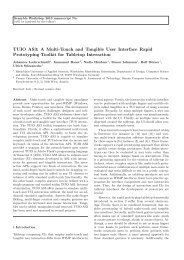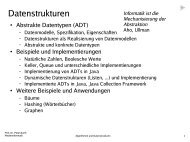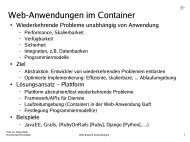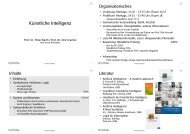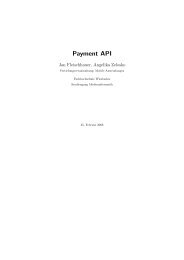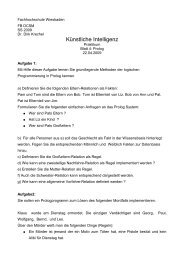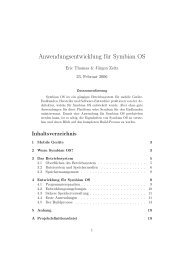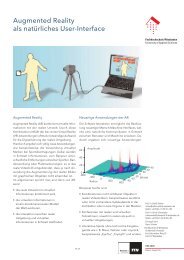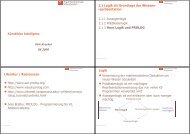4 in 1 - Medieninformatik - Hochschule RheinMain
4 in 1 - Medieninformatik - Hochschule RheinMain
4 in 1 - Medieninformatik - Hochschule RheinMain
Erfolgreiche ePaper selbst erstellen
Machen Sie aus Ihren PDF Publikationen ein blätterbares Flipbook mit unserer einzigartigen Google optimierten e-Paper Software.
Programmieren <strong>in</strong> C<br />
E<strong>in</strong>führung <strong>in</strong> C<br />
Programmieren <strong>in</strong> C<br />
E<strong>in</strong>führung <strong>in</strong> C<br />
Übersetzen und Starten<br />
Übersetzungsprozess<br />
Separate Übersetzung <strong>in</strong> e<strong>in</strong>e ausführbare Datei<br />
Was passiert bei der Übersetzung im Detail<br />
Datei hello.c mit Editor erstellen<br />
• Emacs oder vi empfohlen<br />
• Geany oder auch IDE möglich<br />
Übersetzen mit C-Compiler<br />
• (g)cc, (GNU) C Compiler<br />
• Erzeugt ausführbares Programm,<br />
Datei a.out<br />
Compiler-Optionen -g -ansi -Wall -o<br />
• Debug, ANSI-Standard, Warnung<br />
• Ausgabedatei ist hello<br />
Ausführen<br />
• Aufruf Name erzeugter Datei<br />
• Auf Kommandozeile<br />
• ./ davor wenn . nicht im Pfad<br />
$ ls -l hello.c<br />
-rwx------ 1 pb pb 80<br />
30. Aug 13:33 hello.c<br />
$ gcc hello.c<br />
$ ls -al a.out<br />
-rwx------ 1 pb pb 4699<br />
30. Aug 13:46 a.out<br />
$ ./a.out<br />
Hello C World<br />
$ gcc -g -ansi -Wall hello.c -o hello<br />
$ ls -l ./hello<br />
-rwx------ 1 pb pb 5871<br />
30. Aug 13:47 ./hello<br />
$ ./hello<br />
Hello C World<br />
Präprozessor<br />
• Fügt Quelltexte/Include-Dateien e<strong>in</strong>, Konvention<br />
Endung .h (Header), sucht Dateien <strong>in</strong> bestimmten<br />
Verzeichnissen /usr/<strong>in</strong>clude/...,<br />
• Textuelle Ersetzungen<br />
C-Compiler<br />
• Übersetzt C-Quellcode <strong>in</strong> hardwarespezifische<br />
Assemblersprache<br />
• Optimierungen<br />
Assembler<br />
• Übersetzt Assembler <strong>in</strong> Masch<strong>in</strong>ensprache<br />
L<strong>in</strong>ker<br />
• B<strong>in</strong>det externen Objektcode e<strong>in</strong> (z.B. pr<strong>in</strong>tf), sucht<br />
Bibliotheken <strong>in</strong> bestimmten Verzeichnissen<br />
/usr/lib/...,<br />
hello.c<br />
gcc hello.c -o hello<br />
Präprozessor<br />
C-Compiler<br />
Assembler<br />
L<strong>in</strong>ker<br />
hello<br />
Prof. Dr. Peter Barth (HS-Rhe<strong>in</strong>Ma<strong>in</strong>) Programmieren 3 29. Januar 2013 13 / 326<br />
Prof. Dr. Peter Barth (HS-Rhe<strong>in</strong>Ma<strong>in</strong>) Programmieren 3 29. Januar 2013 14 / 326<br />
Programmieren <strong>in</strong> C<br />
E<strong>in</strong>führung <strong>in</strong> C<br />
Programmieren <strong>in</strong> C<br />
E<strong>in</strong>führung <strong>in</strong> C<br />
Makefiles<br />
Automatisierung des Übersetzungsprozesses ...<br />
Variablen<br />
1 Def<strong>in</strong>ition: CC=gcc<br />
• Verwendung mit $(CC)<br />
• Variablennamen per Konvention<br />
GROßBUCHSTABEN<br />
Regeln<br />
4 Ziel hello und Abhängigkeit hello.c<br />
• Um Ziel zu machen, schaue ob<br />
Abhängigkeit neuer ist als hello, wenn<br />
ja dann mache<br />
5 Führe Befehl (mit Ersetzungen) aus<br />
Verwenden auf Kommandozeile<br />
• Auf Kommandozeile make<br />
• Ziel als Parameter möglich<br />
Makefile<br />
1 CC=gcc<br />
2 CFLAGS=-ansi -g -Wall<br />
3<br />
4 hello: hello.c<br />
5 $(CC) $(CFLAGS) hello.c -o hello<br />
$ make<br />
gcc -ansi -Wall hello.c -o hello<br />
$ ./hello<br />
Hello C World<br />
Makefiles<br />
... etwas ausführlicheres Beispiel, Details im Informationsblatt<br />
Ziel all<br />
• Erstes Ziel ist Default-Ziel<br />
• Konvention all<br />
Trennen Compile/L<strong>in</strong>k<br />
• Erst Objekt-Datei mit -c<br />
• Dann B<strong>in</strong>den/L<strong>in</strong>ken<br />
Beispiel<br />
• Mache rot13 falls rot13.o neuer<br />
• Mache rot13.o falls rot13.c ...<br />
Ziel clean<br />
• Konvention, zum Löschen aller<br />
erzeugten Dateien<br />
• Ohne Abhängigkeit (Datei clean nicht<br />
vorhanden), immer ausführen<br />
Makefile<br />
1 CC=gcc<br />
2 CFLAGS=-ansi -g -Wall<br />
3<br />
4 all: hello rot13<br />
5<br />
6 hello: hello.c<br />
7 $(CC) $(CFLAGS) hello.c -o hello<br />
8<br />
9 rot13.o: rot13.c<br />
10 $(CC) -c $(CFLAGS) rot13.c -o rot13.o<br />
11<br />
12 rot13: rot13.o<br />
13 $(CC) $(CFLAGS) rot13.o -o rot13<br />
14<br />
15 clean:<br />
16 # - vor Befehl, ignoriere Fehlschlag<br />
17 -/b<strong>in</strong>/rm -f hello rot13 rot13.o<br />
Prof. Dr. Peter Barth (HS-Rhe<strong>in</strong>Ma<strong>in</strong>) Programmieren 3 29. Januar 2013 15 / 326<br />
Prof. Dr. Peter Barth (HS-Rhe<strong>in</strong>Ma<strong>in</strong>) Programmieren 3 29. Januar 2013 16 / 326



